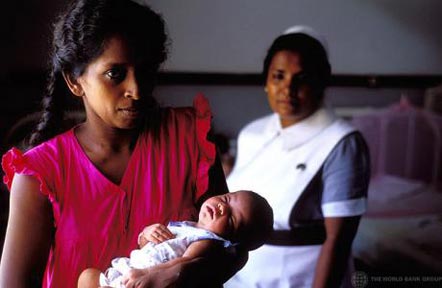Who performs the drudgery?
A conference on feminist economics agree that woman's
work is still undervalued globally and dogged by an enduring
subconscious colonial mindset:
by Dawn Foster
Women's labour is undervalued. Few could argue with that statement:
the evidence is available anecdotally in our day to day lives, in the
types of work available to women across the globe, and in the pay and
remuneration women receive for their labour. Statistically, it's
undeniable: wherever a labour market exists, a gender pay gap is
evident. Two of the speakers at the Conference pointed out that
globally, the cost of the gender pay gap is $17trillion: comparable to
the combined gross domestic product of France, the United Kingdom, and
Germany.
But focussing on paid labour overlooks the problem of care in
attempts to widen and improve women's economic empowerment globally. One
of the participants argued that addressing heavy and unequal care is the
only way of achieving more economic justice for women. While women carry
out more housework and more childcare, economic empowerment often means
that paid labour is taken on in addition to the heavy burden of care
work in the home.
|

Woman with newborn child in post-natal ward of hospital, Sri
Lanka. Credit: World Bank Photo Collection |
Gender inequality even affects sleep, when it comes to work. Due to
care burdens, women sleep less than men even when they are not
participating in paid work, an Action Aid report into households in ten
developing countries showed. Oxfam found that in the six countries they
surveyed, when combining paid work, and unpaid care work, women worked
for more hours than men in every country. So while unpaid care and work
is undervalued, it also encroaches on women's leisure, and rest, and
therefore health.
But care burdens can violate women's human rights, specifically the
right to enjoy the benefits of scientific progress, the right to
participation in civic life, and the right to rest and leisure.
Women's economic empowerment is not simply about labour force
participation: it must also encompass and consider choice to work,
choice of sector, location and working hours. When working for women's
economic empowerment, societies, politicians and development workers
need to make sure women's economic empowerment doesn't come at the cost
of time poverty: leisure and rest are just as important. For instance,
introducing low-cost fuel-efficient stoves, washing machines and
improving access to safe water reduces the time women spend on unpaid
labour and care work, because the tasks are completed more efficiently,
in a shorter space of time, freeing women's time and allowing more space
for leisure, rest, or entry into the paid workforce.
Conversely, some studies have found that introducing electricity into
homes often has the opposite effect: with the period in which work can
be undertaken expanding, work grows to fill the time, rather than
allowing tasks to be performed in a shorter period. Technology alone
cannot be a liberator without an attendant change in social attitudes
towards unpaid work and a shift in the gender burden of work.
The question "who performs the drudgery?" in society is a gendered
one, but one that cannot be considered without looking at intrinsic
class and race factors.
Care workers, low paid health assistants, cleaners and child minders
in society are predominantly women, but also working class, and often
black or Asian, globally.
When theorists of contemporary global justice focus intently on
income inequality without considering the colonial legacy's impact on
inequality, five centuries of oppression are ignored when seeking to
understand modernity. To imagine that the colonial period is purely of
the past, and that there is no economic, social and political hangover
is to deny reality.
The experience of migrant workers, and migration patterns globally
prove this to be a falsehood. Joan Tronto directs our attention to a
passage in Thomas More's Utopia, on who carries out the back-breaking,
menial work: "Another sort of slave are the poor of the neighbouring
countries, who offer of their own accord to come and serve them: they
treat these better, and use them in all other respects as well as their
own countrymen, except their imposing more labour upon them, which is no
hard task to those that have been accustomed to it."
This illustrates the colonial hangover in our attitude towards care
and 'drudgery': thousands of professionals, especially in medicine,
still migrate from the global south to work in caring professions in the
West. Without migrant workers, the National Health Service in the UK
would collapse - health workers simply aren't being trained fast enough
to cope with demand. Meanwhile, a 'brain drain'or 'care drain' continues
to affect the global south. Tronto notes that Africa trains 3% of the
world's physicians, but shoulders 24% of the world's "disease burden".
The world is already short of four million health care workers, many of
whom train in the global south, then migrate to the North. That this is
rarely considered, speaks of the continuing subconscious mindset of
colonialism - that accepting the fact so many people migrate from
developing countries to perform the "drudgery" work is only socially
palatable if we attach different worths to human lives, based on
nationality, gender and economic position. The neoliberal attachment to
capital as a measure of human worth and value only bolsters this
mindset, and so further entrenches women's position as the underclass in
society.
(Dawn Foster is a London-based journalist, writing
predominantly on social affairs, politics, economics and women's rights.
She is co-editor of openDemocracy 50.50. She spent several years working
at the Guardian newspaper before freelancing full-time.
She is a regular contributer to the Guardian,
London Review of Books, Times Literary Supplement, New Humanist, and
regularly appears as a political commentator on BBC's Newsnight and Sky
News. She has previously worked in politics and higher education.)
|

